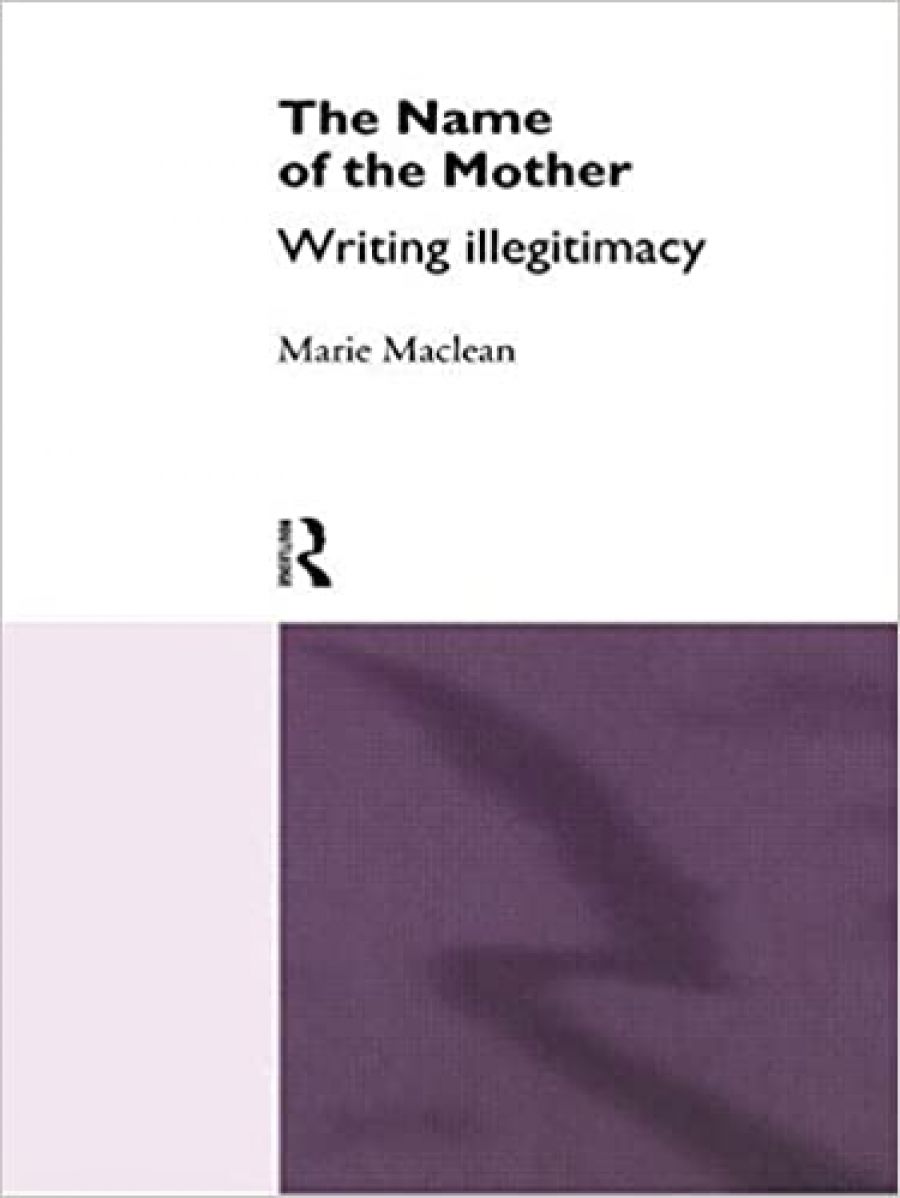
- Free Article: No
- Contents Category: Literary Studies
- Review Article: Yes
- Online Only: No
- Custom Highlight Text:
For some time now literary criticism has been fascinated by the role of naming, and the inscription of the name, in relation to the identity of the self. There are rich pickings to be had from examining autobiography for the way the writer reveals and hides behind the words with which a life is described. And in this era of autobiographical and biographical tumescence, it is most important that the analysis of such writing is done by those with the ability to do so. Think of the recent debates over biographies and autobiographies in Australia and you will quickly recognise how unsophisticated is our general understanding of what is going on when a life is inscribed, and yet how different the living is from the writing.
- Book 1 Title: The Name of the Mother
- Book 1 Subtitle: Writing illegitimacy
- Book 1 Biblio: Routledge, $120 hb
It is a real pleasure, then, to find someone such as Marie Maclean picking up the topic and applying herself to it with acumen and flair. If her book were an addition to the literature on writing the self, it would be welcome. Because it is more than an addition, because it is an original path of its own, it is not only welcome but needed.
Now it’s here, it seems so obvious. A book about bastardy. A book, in Marie Maclean’s terms, about legitimation, relegitimation and delegitimation – specifically, the way that writing from the outside, the illegitimate space of the artist, gives access to a kind of powerful strength, a ‘dynamism’ that we associate with writing as a subversive art. The name of the father becomes a ‘potential site of resistance’, and many artists have found it liberating to adopt, either literally or symbolically, the name of the mother, an act of delegitimation that frees them from the social control and rigidity of the patronym.
This is not the substitution of matriarchy for patriarchy-that is the way of relegitimation, and, using the terminology of Deleuze and Guattari, Maclean sees this as resulting in schizoid divisions, a desire to fake it, to try to find an equivalent to the dominating force that is the hierarchical social order. Illegitimacy works transgressively:
What illegitimacy does, by making the line of flight tangible and by breaking the continuity, is to actualise transgression, but also to point to a way of using drift for one’s own purposes. So one can argue that matriarchy merely substitutes another form of the symbolic order in its law, whereas illegitimacy, especially when not socially integrated, offers a genuine discontinuity. This is why the first impulse of the bastard is always towards relegitimation, since the advantages of transgression are seldom immediately perceptible.
That’s the theory. The practice takes us to the life and work of a fascinating array of writers: George Sand, Olympe de Gouges, Flora Tristan, Louise Michel, Stendhal, Nerval, Baudelaire, Sartre, Freud, Derrida. (Isn’t it interesting that I must give you both names of the women, and the men are easily identifiable by their patronym? – read this book to find out why that is so.)
Obviously, the bias is French. Marie Maclean has nurtured an extraordinary number of students from within the French Department of Monash University – me among them. Her especial skill, however, dazzlingly evident here, is to use her speciality as a door out of the house into the world, not vice versa. The early chapters on Olynpe de Gouges and Flora Tristan, for example, are full of information that not only builds the case for the way transgressive writers are able to deploy their illegitimacy to their own powerful cause but is also delightfully surprising and useful in its own right. This is the kind of writing that makes this book so readable:
There is one form of undeniably permanent exclusion, one boundary most sharply defined, and one right to which the revolution admitted women: the guillotine. Within a space of twenty-one days at the end of 1793 three participants in the ‘monstrous regiment’ – ‘brawling and contentious women’, in the eyes of the Committee of Public Safety – were executed: Marie Antoinette, political puppet of Austria and debauched wife, Olympe de Gouges, whose madness led her to think herself a statesman; and Madame Roland, part-time philosopher and queen for a day...
And if you want to read someone who can handle Derrida’s own form of delegitimating writing, the final chapter of The Name of the Mother will give you much joy.


Comments powered by CComment